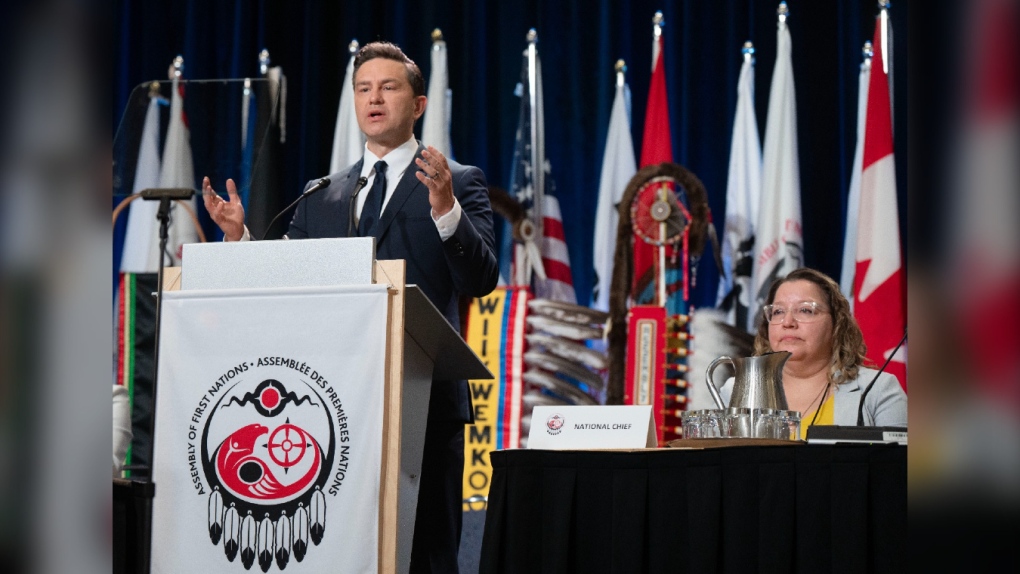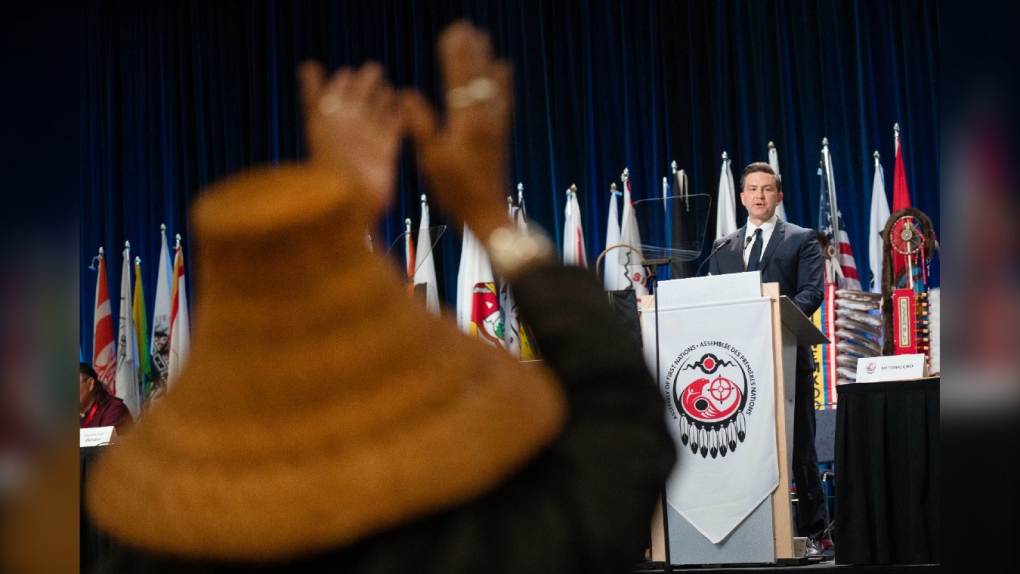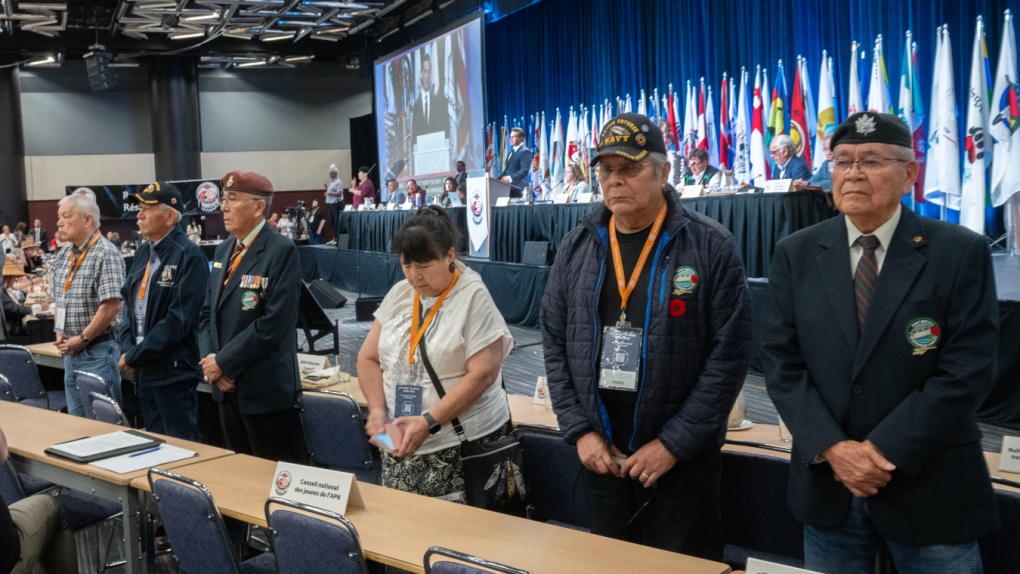Northern Ont. First Nation chief among Indigenous leaders upset with Poilievre’s AFN speech
Outgoing Nipissing First Nation Chief Scott McLeod is among several Indigenous leaders who are calling out federal Conservative leader Pierre Poilievre over a speech he made at the Assembly of First Nations' annual general meeting.
 Federal Conservative leader Pierre Polievre speaks to the Assembly of First Nations as National Chief Cindy Woodhouse Nepinak looks on Thursday, July 11, 2024 in Montreal. (THE CANADIAN PRESS/Ryan Remiorz)
Federal Conservative leader Pierre Polievre speaks to the Assembly of First Nations as National Chief Cindy Woodhouse Nepinak looks on Thursday, July 11, 2024 in Montreal. (THE CANADIAN PRESS/Ryan Remiorz)
In his opening remarks in Montreal on Thursday, Poilievre made a reference to "our" First Peoples, offending several in attendance, including McLeod.
Why is that offensive?
"They speak, you know, like they are dominant, that they have jurisdiction over us, that they're very 'parental' when it comes to First Nations," McLeod told CTVNewsNorthernOntario.ca in a Zoom interview Friday.
He said it is something that needs to be corrected and recognized as being something that needs to change in the country.
"We do not belong to Canada. We were here before Canada," McLeod said.
"It just speaks volumes to the mindset that colonial governments have towards First Nations that we're not nation-to-nation in their eyes no matter how they try and tell us that, because it's not in their actions and it's not in the way they speak."
Met with some skepticism
McLeod said he is "very skeptical" of the Conservative party because of their history and track record.
"Mr. Poilievre worked for Prime Minister Harper during his tenure and a lot of policies that were created by that leadership were not very favourable to Indigenous people," McLeod said.
The assembly was attended by Indigenous representatives from across the country, politicians and other dignitaries to address some of the challenges First Nations communities are facing.
"There's a long history of very strained relations between the Conservative party and First Nations in this country," McLeod said.
"There's a lot of ground to make up there for any incoming potential candidate for prime minister and the Conservative party to communicate just how they're going to repair those broken relationships."
Economic reconciliation plans
Some chiefs did like some of what the Conservative leader had to say, applauding generously during a moment of the speech that outlined his commitments to advancing economic reconciliation with First Nations and creating jobs, especially through resource development.
 Federal Conservative leader Pierre Polievre receives applause during his speech to the Assembly of First Nations, Thursday, July 11, 2024 in Montreal. (THE CANADIAN PRESS/Ryan Remiorz)
Federal Conservative leader Pierre Polievre receives applause during his speech to the Assembly of First Nations, Thursday, July 11, 2024 in Montreal. (THE CANADIAN PRESS/Ryan Remiorz)
"We believe that economic reconciliation is part of social progress," Poilievre said.
"We need jobs and opportunity for First Nations communities."
Instead of having companies rely on temporary foreign workers to fill jobs, that work should go to Indigenous youth, Poilievre explained.
He also mentioned the Ring of Fire project, criticizing the Liberal government’s decision to "kill the Teck Frontier mine, a $20 billion project."
"It didn't consult with all the surrounding First Nations that supported the project, nor has it properly consulted with the many First Nations in northern Ontario that want the Ring of fire but can't get it because we have a 'wacko' environment minister who doesn't want to grant a permit to build a road to get there," Poilievre said.
"We need to get the federal government to consult with you on your opinion even when that opinion is yes, this is important because we've seen the successes that can happen when we say 'yes.'"
Missed opportunities
Some critics have slammed the speech for not addressing the issue of missing and murdered Indigenous women and girls, climate change or whether his government would support the $47.8 billion child welfare reform.
"There was a lot of talk about generalities of what the Conservative party hopes, but nothing really in the way of details of how they're going to do that," McLeod said.
"I get it. He's not Justin Trudeau, but tell us what you're going to do, not what Justin did wrong. He talks about empowering First Nations to do their own governance and make their own decisions and determine their own future, but he doesn't talk about any details about financial resources, about program dollars or anything like that. I want to hear the details of how we're going to do those things."
In his speech, Poilievre reminded the crowd that it was the former Conservative government that delivered the historic 2008 apology on behalf of Canada for forcing thousands of First Nations, Métis and Inuit children to attend government-funded, church-run schools.
A handful of chiefs, veterans and representatives from the assembly's 2SLGBTQ+ council chose to stand silently and turn their back on the Conservative leader while he spoke.
 First Nation veterans turn their backs as Federal Conservative leader Pierre Polievre speaks at the Assembly of First Nations, Thursday, July 11, 2024 in Montreal. (THE CANADIAN PRESS/Ryan Remiorz)
First Nation veterans turn their backs as Federal Conservative leader Pierre Polievre speaks at the Assembly of First Nations, Thursday, July 11, 2024 in Montreal. (THE CANADIAN PRESS/Ryan Remiorz)
Correcting historic wrongs
At that time, he said Conservatives will work to redress historic discrimination in the child-welfare system and resolve "other outstanding issues."
The AFN and the government reached an historic deal to reform child welfare earlier this week.
That came more than 17 years after the organization, along with the First Nations Child and Family Caring Society, initiated a human-rights complaint over chronic government underfunding of child welfare services on reserves.
"I think in the end, the chiefs will fully accept it and work towards making things better for the Indigenous children in this country, who mostly end up in these childcare situations because of the history of Canada and what has been done to the families of these communities for the last almost two centuries now," McLeod said.
"I'm not going to give them any congratulations or any pats on the back for correcting something that's been so hideous and wrong over the last, you know, better part of two centuries because they're finally stepping up and doing the right thing."
However, he said it is a step in the right direction.
The Harper government was heavily criticized for fighting that complaint in court for years.
In turn, the Liberals have faced criticism for failing to act to implement orders made by the Canadian Human Rights Tribunal after its finding that First Nations children were discriminated against.
The Conservative party told CTV News it is standing by its leader’s speech.
McLeod said he would like to see Poilievre sit down with Indigenous representation and engage in meaningful discussions about issues nations and communities face.
He is also encouraging Indigenous people across the country to think strongly about truth and reconciliation, their nations and communities and the challenges they face before going to the ballot box in October 2025.
With files from CTVNorthernOntario.ca journalist Chelsea Papineau
CTVNews.ca Top Stories

Trump suggests the U.S. should take back the Panama Canal. Could they do that?
Donald Trump suggested Sunday that his new administration could try to regain control of the Panama Canal that the United States 'foolishly' ceded to its Central American ally, contending that shippers are charged 'ridiculous' fees to pass through the vital transportation channel linking the Atlantic and Pacific Oceans.
Weather advisories issued for GTA, areas north of Toronto ahead of 'significant' snowfall
Holiday travellers and commuters could be in for a messy drive on Monday morning as a significant round of snowfall moves into the region.
Man handed 5th distracted driving charge for using cellphone on Hwy. 417 in Ottawa
An Ottawa driver was charged for using a cellphone behind the wheel on Sunday, the fifth time he has faced distracted driving charges.
Wrongfully convicted N.B. man has mixed feelings since exoneration
Robert Mailman, 76, was exonerated on Jan. 4 of a 1983 murder for which he and his friend Walter Gillespie served lengthy prison terms.
What's open and closed over the holidays in Canada
As Canadians take time off to celebrate the holidays, many federal offices, stores and businesses will be closed across the country on Christmas Day and New Year's Day.
opinion Christmas movies for people who don't like Christmas movies
The holidays can bring up a whole gamut of emotions, not just love and goodwill. So CTV film critic Richard Crouse offers up a list of Christmas movies for people who might not enjoy traditional Christmas movies.
Can the Governor General do what Pierre Poilievre is asking? This expert says no
A historically difficult week for Prime Minister Justin Trudeau and his Liberal government ended with a renewed push from Conservative Leader Pierre Poilievre to topple this government – this time in the form a letter to the Governor General.
More than 7,000 Jeep vehicles recalled due to rearview camera display issue
A software issue potentially affecting the rearview camera display in select Jeep Wagoneer and Grand Cherokee models has prompted a recall of more than 7,000 vehicles.
'I'm still thinking pinch me': lost puppy reunited with family after five years
After almost five years of searching and never giving up hope, the Tuffin family received the best Christmas gift they could have hoped for: being reunited with their long-lost puppy.
































